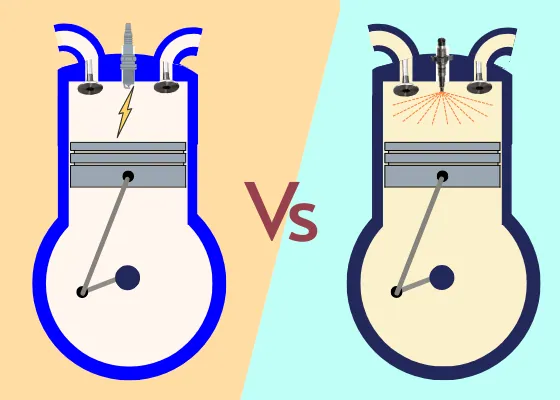The basic difference between these two engines is that the four stroke petrol engines use a spark plug for the ignition while the four stroke diesel engine uses a higher compression ratio so that the fuel can undergo auto-ignition.

In this article, we’re going to discuss:
- Four stroke petrol engine:
- Four stroke diesel engine:
- Difference between four-stroke petrol and diesel engine:
- FAQs:
Four stroke petrol engine:
These are the spark ignition (SI) engines that work on a principle of the Otto cycle. In these engines, the fuel is mixed with air before it reaches the combustion chamber.
In this, the air-fuel mixture is ignited by the generation of a spark with the help of a spark plug. As these engines don’t have autoignition, these engines work at a comparatively lower compression ratio.
These internal combustion engines are noticed mostly in light-duty applications like cars, two-wheelers, smaller generators, ATVs, etc.
Four stroke diesel engine:
These are the compressed ignition engines that work on the Diesel cycle. In these engines, the air is compressed at high pressure to reach the auto-ignition temperature of the diesel. Then the fuel is spread in the hot air with the help of a fuel injector.
As the fuel is directly injected into the pressurized air in the combustion chamber, it requires a high-pressure fuel injection system.
These engines are used in heavy-duty applications like trucks, tractors, Diesel generators, cargo ships, etc.
Difference between four-stroke petrol and diesel engine:
| Sr. No. | Four Stroke Diesel Engine | Four Stroke Petrol Engine |
|---|---|---|
| 1 | The higher compression ratio helps for the auto-ignition of the fuel. | In this engine, Combustion starts due to the generation of a spark in the Air-Fuel Mixture. |
| 2 | It works on Diesel Cycle. | It works on Petrol or Otto Cycle. |
| 3 | In this engine, Diesel is used as fuel. | In this engine, Petrol (gasoline), ethanol, CNG, etc. are used as Fuel. |
| 4 | Fuel mixes with air in the carburetor or in the intake manifold before going to the combustion chamber. | Spark Plug generates a spark to ignite the charge. |
| 5 | Fuel mixes with air inside the combustion chamber. | Fuel mixes with air in the carburettor or in the intake manifold before going to the combustion chamber. |
| 6 | It requires a high-pressure fuel injection system. | The high-pressure fuel injection system is not necessary. |
| 7 | These engines produce more torque. | It produces comparatively lower torque. |
| 8 | It runs at a lower RPM. | It runs at a comparatively higher RPM. |
| 9 | The fuel used is less volatile. | Less fuel consumption as the fuel used is more dense. |
| 10 | Lower wear of cylinder due to the lubricating properties of diesel. | The gasoline can wear the engine components faster. |
| 11 | The compression Ratio is High. | It works at a lower compression ratio. |
| 12 | It has a more rigid design because of the higher compression ratio. | These engines are less rigid than four-stroke diesel engines. |
| 13 | These engines last longer than petrol engines. | It has a lower lifespan than four-stroke diesel engines. |
| 14 | Less fuel consumption as the fuel used is higher dense. | The initial cost of a four-stroke diesel Engine is High. |
| 15 | The initial cost of Four Stroke Diesel Engine is High. | It has a lower initial cost. |
| 16 | More maintenance costs as it uses costly components. | Less maintenance cost. |
| 17 | It is used in heavy-duty applications like buses, trucks, farm tractors, etc. | It is used in light-duty vehicles like two-wheelers, cars, ATVs, etc. |
| 18 | Difficult to a cold start. | Cold starting is easier because of the spark plug. |
FAQs:
-
Which engine has a higher life expectancy, a four-stroke petrol or a diesel engine?
The four-stroke diesel engines last longer than petrol engines because of their more rigid structure.
-
Are four-stroke diesel engines cheaper than petrol engines?
No, four-stroke diesel engines are more expensive than four-stroke petrol engines.